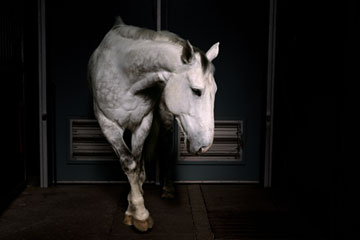
Horses can lapse into apparent depression when they lose a companion.
Nobody feels cuddly about crows. They're too big, too loud, too mean. They scavenge with the greed of buzzards, prey without the grace of eagles and even chase down children who come too close to their nests. They are the dark symbols of human mythology--portents of plague, of sorcery, of evil. There's a reason the proper term for a flock of them is a murder of crows, and it's not because we like having them around.
But there's something deeper going on in the soul of a crow. An animal that inflicts death so readily seems deeply moved when one of its own kind dies. A dead crow lying in the open will quickly attract two or three other crows. They dive and swoop and scold--emitting a very particular call that summons up to a hundred other members of the flock. With near ceremonial coordination, they land and surround the body, often in complete silence. Some may bring sticks or bits of grass and lay them next to--or even on top of--the remains. Then, tribute paid, they turn and fly off.
"They seem," says University of Washington wildlife scientist John Marzluff, "to be mourning a loss."
That, it hardly needs saying, is not what we expect. Human beings have fixed ideas about the hearts and minds of beasts, most of them not very flattering. Animals are simpletons on the whole, sometimes capable of impressive flashes of cleverness and a kind of wagging, nuzzling, tongue-lolling love. But abstraction? No. Empathy? No. Even a rudimentary sense of the arc of life and their mortality and the great wrenching loss that is death? Please.
And yet the fieldwork says otherwise. There are accounts of chimp mothers that refuse to surrender a baby that has died, holding the body for days or weeks after it has gone cold and begun to decompose. There are elephants that stay by the body of a fallen herdmate long after a death--examining, touching, attending--or stop to caress and examine elephant bones they find. There are dogs and cats that languish and refuse food when a playmate dies, the cats expressing their grief with a terrible keening cry. Bonobos rage, rage against the dying of the light, sometimes throwing rocks at a dead troopmate and pounding its chest in frustration before pounding their own. Apparent sorrow following a death has been observed on the farm--among goats, pigs, ducks--and in the oceans as dolphin mothers, like primate mothers, push the bodies of their dead young in front of them.
It's impossible to look at this behavior and not see something that's an awful lot like mourning, and yet science, in its own way, rages against all of it. For every seeming grief ritual, it's possible to posit a cold, adaptive purpose: sorrow may simply be fear of the predator that killed a friend; rage may be an attempt to repel the same killer. And without the aid of self-reporting, which is a pillar of human psychological research, it's anthropomorphic in the extreme to presume to know what's going on in the heads of animals. Science's complaints are legitimate--and they miss something too.
